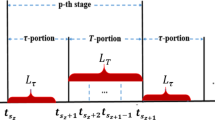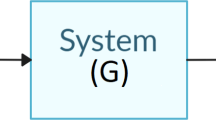Abstract
In this paper, algorithms to compute robust control invariant sets are proposed for linear continuous-time systems subject to additive but bounded disturbances. Robust control invariant sets of linear time invariant systems are achieved by logarithmic norm. Robust control invariant sets of linear uncertain systems, which are level sets of the storage functions, are obtained by solving functional differential inequality. Simulation shows that the proposed algorithms can yield improved minimal volume robust control invariant sets approximations in comparison with the schemes in the existing literature.
Similar content being viewed by others
References
I. Kolmanovsky and E. Gilbert, “Theory and computation of disturbance invariant sets of discrete-time linear systems,” Math. Probl. Eng., vol. 4, no. 4, pp. 317–367, April 1998.
F. Tahir and I. M. Jaimoukha, “Roubst positively invariant sets for linear systems subject to model-uncertainty and disturbances,” Proc. of 4th IFAC Nonlinear Model Predictive Control Conference, pp. 69–73, 2012.
F. Tahir and I. M. Jaimoukha, “Low-complexity polytopic invariant sets for linear systems subject to norm-bounded uncertainty,” IEEE Trans. Automat. Contr., vol. 60, no. 5, pp. 1416–1421, May 2015. [click]
M. V. Kothare, V. Balakrishnan, and M. Morari, “Robust constrained model predictive control using linear matrix inequalities,” Automatica, vol. 32, no. 10, pp. 1361–1379, October 1996. [click]
F. Blanchini, “Set invariance in control,” Automatica, vol. 35, no. 11, pp. 1747–1767, November 1999.
E. C. Kerrigan, Robust Constraint Satisfaction: Invariant Sets and Predictive Control, Ph. D. Thesis, University of Cambridge, 2000.
H. Chen and K.-H. Guo, “Constrained H ∞ control of active suspensions: An LMI approach,” IEEE Contr. Syst. Tech., vol. 13, no. 3, pp. 412–421, March 2005.
F. Blanchini and S. Miani, Set-Theoretic Methods in Control, Springer, Boston, 2007.
M. Dorothy and S. Chung, “Switched systems with multiple invariant sets,” vol. 96, pp. 103–109, October 2016.
M. S. Darup and M. Monnigmann, “A stabilizing control scheme for linear systems on controlled invariant sets,” Syst. Contr. Lett., vol. 79, pp. 837–849, May 2015.
D. Q. Mayne, J. B. Rawlings, C. V. Rao, and P. O. M. Scokaert, “Constrained model predictive control: stability and optimality,” Automatica, vol. 36, no. 6, pp. 789–814, June 2000. [click]
H. Chen and F. Allgöwer, “A quasi-infinite horizon nonlinear model predictive control scheme with guaranteed stability,” Automatica, vol. 34, no. 10, pp. 1205–1217, October 1998. [click]
W. H. Chen, J. O’Reilly, and D. J. Ballance, “On the terminal region of model predictive control for nonlinear systems with input/state constraints,” Int. J. Adaptive Control and Signal Process, vol. 17, no. 3, pp. 195–207, March 2003. [click]
S. Yu, H. Chen, P. Zhang, and X. Li, “An LMI optimization approach for enlarging the terminal region of NMPC,” Acta Automatica Sinca, vol. 34, no. 7, pp. 798–804, July 2008.
S. Yu, H. Chen, and X. Li, “Enlarging the terminal region of NMPC based on T-S fuzzy model,” International Journal of Control, Automation and Systems, vol. 7, no. 3, pp. 481–486, March 2009.
J. Lu, Z. Gao, and F. Gao, “Ellipsoid invariant set-based robust model predictive control for repetitive processes with constraints,” IET Control Theory & Applications, vol. 10, no. 9, pp. 1018–1026, September 2016.
S. V. Rakovic, E. C. Kerrigan, K. I. Kouramas, and D. Q. Mayne, “Invariant approximation of the minimal robust positively invariant set,” IEEE Trans. Automat. Contr., vol. 50, no. 3, pp. 406–410, March 2005. [click]
P. Trodden, “A one-step approach to computing a polytopic robust positively invariant set,” IEEE Trans. Automat. Contr., vol. 61, no. 12, pp. 4100–4205, December 2016.
S. V. Rakovic and M. Baric, “Parameterized robust control invariant sets for linear systems: Theroetic advances and computational remarks,” IEEE Trans. Automat. Contr., vol. 55, no. 7, pp. 1599–1614, July 2010. [click]
S. V. Rakovic, E. C. Kerrigan, D. Q. Mayne, and K. I. Kouramas, “Optimized robust control invariance for linear discret-time systems: Theoretical foundations,” Automatica, vol. 43, no. 5, pp. 831–841, May 2007. [click]
C. Liu and I. Jaimoukha, “The computation of fullcomplexity polytopic robust control invariant sets,” Proc. of 54th IEEE Conference on Decision and Control, pp. 6233–6238, 2015. [click]
T. B. Blanco, M. Cannon, and B. D. Moor, “On efficient compuation of low-complexity controlled invariant sets for uncertain linear systems,” Int. J. Contr., vol. 83, no. 7, pp. 1339–1346, 2010. [click]
S. V. Rakovic, A. R. Teel, D. Q. Mayne, and A. Astolfi, “Simple robust control invariant tubes for some classes of nonlinear discrete time systems,” Proc. of 45th IEEE Conf. Decision Contr., pp. 6397–6402, 2006.
M. Korda, D. Henrion, and C. N. Jones, “Convex computation of the maximum controlled invariant set for discrettime polynomial control systems,” Proc. of 52th IEEE Conf. Decision Contr., pp. 7107–7112, 2013.
M. Korda, D. Henrion, and C. N. Jones, “Convex computation of the maximum controlled invariant set for discrettime polynomial control systems,” SIAM J. Contr. Optim., vol. 52, no. 5, pp. 2944–2969, May 2014. [click]
Y. Li and Z. Lin, “The maximal contractively invariant ellipsoids for discrete-time linear systems under saturated linear feedback,” Automatica, vol. 76, pp. 336–344, February 2017. [click]
M. Fiacchini, T. Alamo, and E. F. Camacho, “On the computation of convex robust control invariant sets for nonlinear systems,” Automatica, vol. 46, no. 8, pp. 1334–1338, August 2010.
K. Takaba and Y. Tomida, “Ellipsoid invarinat set of fractional order uncertain systems subject to actuator saturation and disturbance,” Proc. of 35th Chinese Control Conference (CCC), pp. 10 412–10 417, 2016.
S. Boyd, L. El Ghaoui, E. Feron, and V. Balakishnan, Linear Matrix Inequalities in System and Control Theory. SIAM, Philadelphia, 1994.
G. Dahlquist, Stability and Error Bounds in the Numerical Integration of Ordinary Differential Equations, Kungl. Tekniska Högskolaus Handlingar, Stockholm, Nr. 130, 1959.
K. Dekker and J. G. Verwer, Stability of Runge-Kutta Methods for Stiff Nonlinear Differential Equations, North-Holland, Amsterdam, 1984.
T. Ström, “On logarithmic norms,” SIAM J. Numer. Anal., vol. 12, no. 5, pp. 741–753, May 1975. [click]
H. K. Khalil, Nonlinear Systems, 3rd edition, Prentice Hall, New York, 2002.
V. Blondel and A. Megretski, Unsolved Problems in Mathematical Systems and Control Theory, Princeton University, Princeton, New Jersey, Press, 2004.
S. Yu, C. Böhm, H. Chen, and F. Allgöwer, “Robust model predictive control with disturbance invariant sets,” Proc. of Amer. Contr. Conf., pp. 6262–6267, 2010. [click]
P. P. Khargonekar, I. R. Petersen, and K. Zhou, “Robust stabilization of uncertain linear systems: quadratic stabilizability and H ∞ control theory,” IEEE Trans. Automat. Contr., vol. 35, no. 3, pp. 356–361, March 1990. [click]
Y. Nesterov and A. Nemirovsky, Interior Point Polynomial Methods in Convex Programming, SIAM Publications, Philadelphia, USA, 1994.
H. Chen and C. W. Scherer, “Moving horizon H ∞ control with performance adaptation for constrained linear systems,” Automatica, vol. 42, no. 6, pp. 1033–1040, June 2006. [click]
Author information
Authors and Affiliations
Corresponding author
Additional information
Recommended by Associate Editor Do Wan Kim under the direction of Editor Myo Taeg Lim. A previous version of part of the paper was presented at the International Conference on Mechatronics and Control, Jinzhou July 3 - 5, 2014. The authors, Shuyou Yu, Ting Qu, Fang Xu, and Yan Ma, gratefully acknowledge support by the National Natural Science Foundation of China (No.61573165, 61520106008).
Shuyou Yu received his B.S. and M.S. degrees in Control Science & Engineering at Jilin University, PR China, in 1997 and 2005, respectively, and his Ph.D. degree in Engineering Cybernetics at the University of Stuttgart, Germany, in 2011. From 2010 to 2011, he was a research and teaching assistant at the Institute for Systems Theory and Automatic Control at the University of Stuttgart. In 2012, he joined the faculty of the Department of Control Science & Engineering at Jilin University, PR China, where he is currently a professor. His main areas of interest are in model predictive control, robust control, and applications in mechatronic systems.
Yu Zhou received her B.S. degree in Electrical Engineering and Automation at Jilin University of Architecture, Changchun, China, in June 2016. Since September 2016, she is studying for a master’s degree in Control Engineering at Jilin University, Changchun, China. Her current research interests include model predictive control, moving horizon estimate.
Ting Qu received her B.S. and M.S. degrees from the Northeast Normal University, Changchun, China, in 2006 and 2008, respectively, and her Ph.D. degree in Control Science and Engineering from Jilin University of China in 2015. Since 2015, she is a Lecturer with the State Key Laboratory of Automotive Simulation and Control at Jilin University, China. Her research interests include model predictive control, driver modeling, and human-machine cooperative control.
Yan Ma received her B.S. degree in Automatica Department at Harbin Engineering University, PR China, in 1992, and her M.S. and Ph.D. degrees in Control Science & Engineering at Jilin University, PR China, in 1995 and 2006, respectively. In 1995, she joined former Jilin University of Technology. From 2007 to 2008, she was a Post doctor at Poly U, Hong Kong. Since 2009, she has been a Professor in Control Science & Engineering at the Jilin University. Her current research interests include nonlinear estimation, optimal and robust control, and applications in battery management system of electric vehicles.
Rights and permissions
About this article
Cite this article
Yu, S., Zhou, Y., Qu, T. et al. Control Invariant Sets of Linear Systems with Bounded Disturbances. Int. J. Control Autom. Syst. 16, 622–629 (2018). https://doi.org/10.1007/s12555-016-0745-8
Received:
Revised:
Accepted:
Published:
Issue Date:
DOI: https://doi.org/10.1007/s12555-016-0745-8




